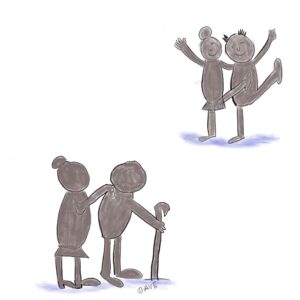
I hear a lot of comments these days about aging–perhaps because I am getting older. Many people say things like “over the hill” or “downhill from here.”
It’s so valuable to assess our mindset. Recent research is demonstrating that our mindset about aging can make a huge difference in our experience and well-being. Becca Levy, researcher and author of Breaking the Age Code: How Your Beliefs About Aging Determine How Long & Well You Live, asserts that our beliefs about aging impact our longevity and quality of life. Those with positive beliefs about aging live about 7.5 years longer than those with negative views. In addition, those with a more positive view of aging have more positive memories, recover more quickly from injuries, and are generally more positive.
In her book, The Inside Story, Susan Sands, makes the case that we can experience more joy as we age as we stay attuned to our body sense or interoceptive awareness. With a positive view of aging, we can appreciate what is happening inside us and outside and experience more presence and joy. Sands suggests that we can actually be more positive as we age.
Other research, shared in the book The Happiness Curve, shows that for many people their later years (late ’60s onward) are the happiest time of their lives. The research suggests there is a positivity curve that goes upward–not the downward curve and over-the-hill image we often share.
What if we could envision aging as a positive opportunity for wisdom and fulfillment, rather than a negative decline? Of course, our bodies age, and we experience loss, but we can reflect on and change our narratives about aging. We can then support changes in the collective narrative. I know of too many people who feel not valued who can actually make a contribution to the lives of others as they age. Just as we are attuned to inequities, we need to be aware of our unconscious biases about age. Are we focusing on older people being slower and less interesting, or appreciating their wisdom? I recently participated in an intergenerational mentoring program where we shared our experiences. Separated by generations, we were able to shed light on different areas and build a meaningful friendship.
Examine your perceptions about aging regarding yourself and others. Are you seeing it as a time of decline or fulfillment? Take an Open Stance and experiment with a positive view of aging and notice the possibilities, your choices, and experience.
